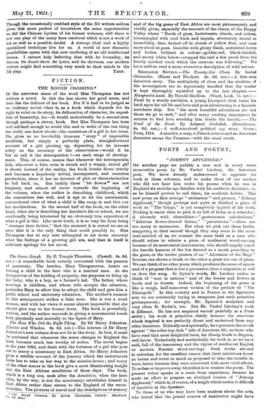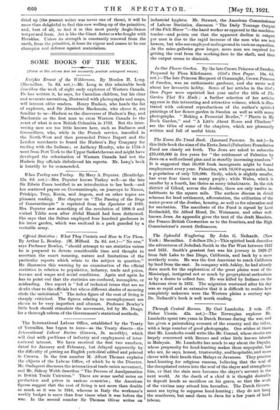POETS AND POETRY.
" JOHNNY APPLESEED."
ON another page we publish a new and in every sense memorable poem by Mr. Vachel Lindsay, the American
poet. We have already endeavoured to appraise his work in these columns, and to make those of our readers who did not hear him recite his poems when he was in
England six months ago amiliar with his aesthetic doctrines, or,
as he himself prefers to call them, his aesthetic habits. This new poem on that strange " enthusiast " and pioneer, " Johnny Appleseed," though perhaps not quite so finished a piece of work as " The Congo," is yet completely typical of his work. Nothing is easier than to pick it as full of holes as a colander ;
it abounds with absurdities—" gastronomic calculations," " delirious flower-dressed fairies," " perorations "—there are too many to enumerate. But when we pick out these faults, staggering in their naivete though they may seem to the more neat-minded of us, we commit the same fault as a man who should refuse to admire a piece of mediaeval wood-carving because of its anatomical inaccuracies, who should angrily reject the bucolic humour of the fox dressed as a monk preaching to the geese, or the tender passion of an " Adoration of the Magi " because one shows a brush or the other a great toe out of place. We can think of no other poem which produces the sense of spaces and of a progress that is less a procession than a migration as well as does this song. In Byron's words, Mr. Lindsay makes us think of "men in nations" and of the beasts and flowers in herds and in forests. Indeed, the beginning of the poem is like a rough, half-humorous version of the prelude to " The Rhinegold." In this country and in France in the figurative arts we are constantly trying to recapture just such primitive grotesqueness ; for example, Mr. Epatein's sculpture and very often M. Rodin's, too. But Mr. Vaohel Lindsay's work is different. He has not acquired naivete painfully in a Paris atelier ; his work is primitive chiefly because the emotions which inspired it are perfectly direct and underived from any other literature. Ethically and spiritually, he represents the revolt against " the roller-top desk " side of American life, as those who have read that moat delightful book, his Handy Guide to Beggars, well know. Technically and aesthetically his work is, as we have said, full of the inaccuracy and the vigour of mediaeval English or modern Russian wood-carvings. Such works abound in mistakes, for the excellent reason that their contrivers knew no better and never so much as proposed to take the trouble to learn better because they were concerned with more vital affairs. To soften or improve away blemishes is to weaken the poem. The present writer speaks in a sense from experience, because he made an effort to prepare an abridged version of " Johnny Appleseed," which is, of course, of a length which makes it difficult of insertion in the Spectator.
To those of us who may have been anxious about the arts, who feared that the primal sources of inspiration might have dried up (the present writer was never one of them), it will be more than delightful to find this new welling-up of the primitive, and, best of all, to find it in this most purely Anglo-Saxon temper and form. Art is like the Giant Antaeus who fought with Herakles. Unless its strength is constantly renewed from the earth, from the primitive, it loses its vigour and ceases to be our champion and defence against materialism.



































 Previous page
Previous page